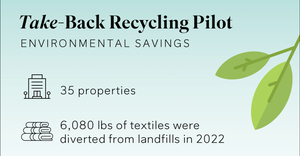Digitalization means gathering more data, leading to better quantitative and qualitative analysis.
Municipalities across the U.S. are beginning to embrace the “smart cities” movement—integrating data and technology to drive efficiency and respond to citizen demands. They are presented with an opportunity to harness technology and improve operations by collecting data and establishing baseline metrics to help inform sustainability and resiliency planning.
“At Rubicon, we think of waste technology in three categories—industry or hauling technology, customer-facing or consumer technology, and sustainability technology,” says Michael Allegretti, head of public policy for Rubicon Global located in Atlanta. “Hauling technology includes what we call ‘tech in trucks’ and big data platforms that enable dispatchers and operations professionals to optimize their assets; customer-facing technology provides visibility and customer service like never before; and sustainability technology provides verified diversion metrics, carbon tracking, and reporting—all as a foundation for sustainable change.”
Allegretti will join Stephanie Stuckey, chief resilience officer for the City of Atlanta and 100 Resilient Cities: Resilient Atlanta, during a spotlight session at 3:30 p.m. May 9, 2017, WasteExpo called “The Digitalization of Waste & Recycling.” The speakers will share details on the partnership Rubicon launched with the City of Atlanta in January 2017 and the effect digitalization has had on the waste and recycling industry.
“Digitalization means gathering more data, leading to better quantitative and qualitative analysis. By gathering data on our waste/recycling status quo, we'll be able to adjust and adapt our policy execution to be more effective and more efficient and hopefully more sustainable and resilient,” says Stuckey. “Our partnership with Rubicon will enable us to know and improve our diversion metrics, carbon tracking, and reporting. The City of Atlanta is pursuing a ‘smart cities’ focus and incorporating data gathering technologies wherever feasible and prudent.”
The digitalization of waste and recycling means utilizing technology and data to make the industry smarter, more efficient, more responsive, and ultimately, more sustainable.
“By collecting and analyzing data—from truck routes, to tonnage, to details about service sites—we are finally able to get a handle on what waste looks like in America, and from there, we are finally able to start solving the environmental and economic issues associated with it,” says Allegretti.
In the early stages of digitization, the hauler technology is providing unprecedented data and visibility into our nation’s waste streams and infrastructure that will enable continuous improvement and smarter operations in the long term. This has been fundamental to the changes we’re seeing and will continue to see over the next decade or more.
“Digitalization is enabling the waste industry to shift business model incentives away from landfills and toward more sustainable solutions,” says Allegretti. “By better understanding what is in our waste and where that waste is going, we are able to identify better solutions and opportunities for that material in the marketplace, rather than just burying it in the ground. And this technology is continuing to evolve—from route optimization to data tracking to service confirmations and more.”
Artificial intelligence, machine learning and autonomous vehicles are just some of the ways the waste industry is looking to evolve in the near future, but today, the “smart cities” movement is quickly revolutionizing what public works departments and sustainability officers at the municipal level can achieve, according to Allegretti.
“Solid waste vehicles are roaming data centers and they represent the next great opportunity to help build 21st Century cities,” he says. “If we can harness their data, analyze it, and identify solutions from it, we just might solve the waste issue, and many other issues, that have plagued our planet and our communities.”
About the Author(s)
You May Also Like


